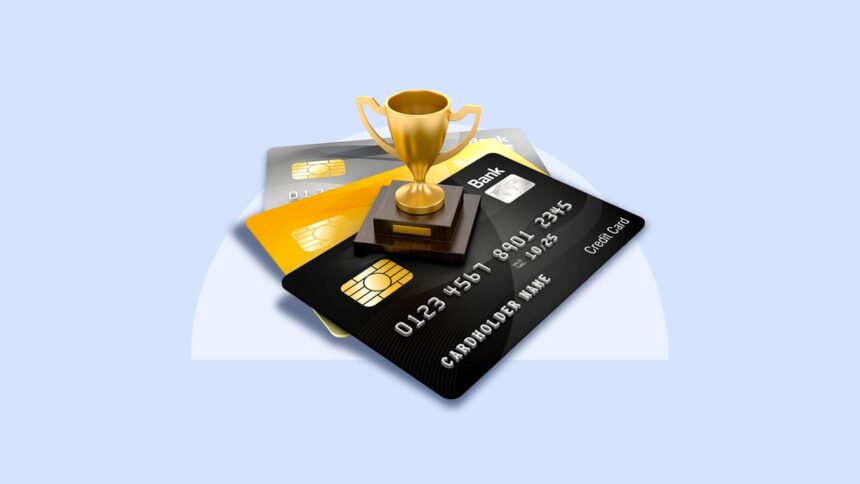
Porcorex/Getty Images; Illustrations by Austin Coule Certified/Bankrate
Rewards are one of the biggest perks of credit cards. They can fly you to a new destination, secure a car rental, or pay for your next grocery run. That may be why even so many people hanging from their heads keeps chasing their rewards.
A new bank rate survey shows that 72% of credit card holders who run their monthly balances from the month are trying to earn credit card rewards.
Credit card interest rates, inflation and other economic factors have made it difficult for Americans to pay their bills. If you only pay for the required fees with credit cards like groceries or gas, it makes sense to earn cashback or travel points on those purchases.
However, if you are focused on maximizing your rewards to the point where you can’t afford to buy, the interest on your unpaid balance will quickly outweigh those rewards.
“It doesn’t make sense to pay 20, 25 or 30% just to earn a few percentage points in cashback or travel rewards,” says Ted Rothman, senior industry analyst at Bankrates.
Bankrates’ key insights into chasing debt credit card rewards
Four in four cardholders try to earn rewards, but two or more in five cardholders still in debt
About three in four Americans (76%) have at least one credit card in their wallet, and there is a good reason.
Credit cards can help you build a great credit score. This will allow you to get better terms such as mortgages, car loans, student loans and more.
Credit cards are more convenient and secure than debit cards. Plus, you’ll often get cashback and travel rewards. This is essentially free money. In fact, four in five cardholders (80%) have at least some effort to get rewards.
But the problem is that more than 7 in 10 credit card holders (72%) who balance each month are still pursuing rewards. This includes 46% who make “some degree of effort” to earn credit card rewards and 26% who make “everything” to do so.
In particular, this is more than 67% of credit card debtors chasing their rewards in 2024.
But spending to keep up with Jones, indulge in discretionary entertainment, or earn credit card rewards doesn’t set you up for long-term financial success.
If you are only charging the required fees, but still have a balance, one of the following (income, inflation, or interest rates) may be holding you back: Learning how to get out of debt with low income is a good place to get started. In the meantime, it is best to clean up your credit card and use cash or debit cards if possible. That way you can focus on paying off the debt you have without adding to it.
Younger generations and higher earners work hard to earn rewards
Whether you look to Z’s love for Amex or nearly double the ownership of a reward card from the lowest to the highest earning parentheses, it’s easy to find people who love credit card rewards.
89% of Gen Z cardholders and 85% of millennial cardholders (ages 29-44) say they are making some or all efforts to win rewards compared to 78% of Gen Xers and 72% of boomers with credit cards.
Meanwhile, 87% of households with cards above $100,000 are trying to earn credit card rewards. This compares to 85% earning between $80,000 and $99,999 per year, 80% earning between $50,000 and $79,999, and 76% earning less than $50,000 per year.
Over half of debtors say it’s becoming more difficult to pay off credit cards
Inflation is still hovering at 3% and credit card interest rates are not expected to fall far below 20%, making credit card balances easy and difficult to pay off.
Over half (54%) of credit card debtors say it has become more difficult to pay off credit card debt over the past year. That includes 31% who say it’s “it’s become much more difficult,” while 23% say it’s “a little harder.”
Only 18% of credit card debtors say they have been easier to pay off their debts over the past year. 29% say the difficulty level is roughly the same.
Older generations who have earned debts or spent time remembering low interest rate years are likely to say that they have become more difficult to pay their debts. Two-thirds of Gen Xers (66%) and more than half of Boomers (56%) say that having credit card debt makes it difficult to pay off debt over the past year. This compares with less than half (46%) of millennials and only 39% of Gen Zers.
What if I have credit card debt instead of chasing the reward?
Paying off credit card debt and earning rewards doesn’t have to be a grand plan for things, but tackling debt must be a top priority. If you can’t pay back your balance at the end of the month, earning these additional points and cashback is not worth spending too much.
- Make a debt repayment plan. Credit card debt is quickly out of control as interest charges are charged daily. “It’s important to pay (debt) cost-effectively as quickly as possible,” Rothman says. “If you can’t pay that right away, sign up for a 0% balance transfer card and avoid interest for up to 21 months.”
- Pay with cash or debit cards instead of credit cards. There are purchases that almost everyone has to make, such as food, gas, utility bills. If you already have a balance, we recommend that you avoid charging your credit card for these purchases. Instead, swipe your debit card or withdraw cash for these daily expenses until your credit card balance returns to $0.
- Consider credit counseling. Rothman also suggests working with reputable nonprofit credit counseling institutions such as Money Management International. “They can often negotiate something like 6-7% interest rates over four or five years,” he explains. Find out more about working with a credit counselor.










